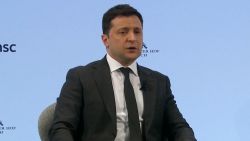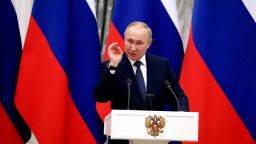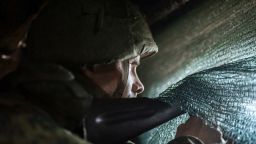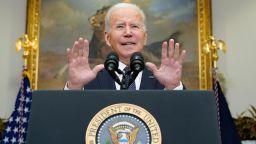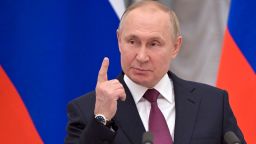Ukraine’s President Volodymyr Zelensky said Saturdaysanctions on Russia should be made public before a possible invasion of Ukraine occurs,as tensions between western nations and Russia continue to intensify.
Zelensky told CNN’s Chief International Anchor Christiane Amanpour in a one-on-one interview at the Munich Security Conference that he disagreed with the stance that sanctions should only be listed after a potential Russian invasion takes place.
“The question of just making it public … just the list of sanctions, for them, for us, to know what will happen if they start the war – even that question does not have the support,” he told CNN.
“We don’t need your sanctions after the bombardment will happen and after our country will be fired at or after we will have no borders, or after we will have no economy … why would we need those sanctions then?”
“We had a discussion some time ago with one of the leaders of one of the leading countries and we were talking about the sanctions policy … we had a different vision on how sanctions should applied when Russian aggression will happen,” Zelensky said. “So when you are asking, what can be done, well, lots of different things can be done. We can even provide you with a list. The most important is willingness.
“If you can’t even disclose what will happen to whom if the war starts … I doubt it will be triggered after it happens,” he added.
The security conference is taking place as the brewing conflict between Russia and Ukraine threatens to boil over and diplomatic efforts stall.

Russia has been tightening its military grip around Ukraine since last year, amassing tens of thousands of troops, equipment and artillery on the country’s doorstep. The aggression has sparked warnings from US officials that a Russian invasion is imminent.
When asked about a potential false flag pretext for war with Russia, Zelensky told Amanpour that “any provocations are very dangerous.”
“I think the most complicated question is that in Crimea, in the temporary occupied territory of the Donbas along Ukraine and Russia, there is 30 to 35,000 on the temporary occupying territories … so provocations are, indeed, very dangerous, if you have this number of troops. One shelling, one cannon fire can lead to war,” Zelensky warned.
“This is what our partners believe, I mean the partners that are around us that have joined borders with us. We know the history of the Soviet Union and they do understand the kind of risks we are facing. Poland, the Baltic states, Lithuania and Estonia, Latvia, Moldova – they know what that could lead to. So, we need to be very careful,” he continued.
He went on to say casualties between Ukraine and Russia were more significant in 2014 but admitted that current tensions are “horrible” and “a tragedy for our nation, for our people.”
“This is the tragedy for Russians as well who used to have good relations with Ukraine,” he added.
The Ukrainian President told CNN that NATO partners needed to clarify a timeline on which the country could join the military alliance.
“Ukraine needs security guarantees,” Zelensky said. “We are smart people, we are not narrow minded. We understand there are lots of different risks because of NATO, there is no consensus around other allies, everyone is saying there is some distance that we need to go between Ukraine and NATO that we need to walk. All we are saying is tell us how much time does it take to complete this distance?”
In earlier remarks to the conference, Zelensky posed a question asking why Ukraine had not been permitted to join NATO. “We are told the doors are open.. but the strangers are still not allowed,” he said.
Moscow sees the growing support for Ukraine from NATO – in terms of weaponry, training and personnel – as a threat to its own security. Putin has also called for specific legal agreements that would rule out any further NATO expansion eastwards towards Russia’s borders, saying the West has not lived up to its previous verbal assurances.
Amanpour also asked Zelensky about the aggressive use of US intelligence to dissuade Putin from invading Ukraine. He said he was “grateful for the work that both of our intelligence has been doing. But the intelligence I trust is my intelligence.
“I trust Ukrainian intelligence who … understand what’s going on along our borders, who have different intelligence sources and understand different risk based on intercepted data… this information should be used.”
He continued: “We are not really living in delusion. We understand what can happen tomorrow … just putting ourselves in coffins and waiting for foreign soldiers to come in is not something we are prepared to do.”
Zelensky then called for international partners to support Ukraine by investing in the country. “Strengthen our arms… our economy. Invest in our country. Bring your business in.
“We are not panicking, we want to live our lives,” he added.
Zelensky also explained that his attendance at the conference on Saturday was to ensure there was a Ukrainian voice was in the room. “I’m the president, it’s important for all our partners and friends to not agree about anything behind our back,” he said. “We’re not panicking, we’re very consistent that we are not responding to any provocations.”
His appearance in Germany had been under intense scrutiny after it was revealed that Biden administration officials had privately urged the Ukrainian leader to remain at home amid concerns of a possible Russian incursion, according to three US officials and one senior Ukrainian official.
Some US officials were concerned that Zelensky’s absence from Ukraine could open the door for Russia to make false claims that he has fled.
However, the president’s office confirmed earlier Saturday he would attend the conference and meet US Vice President Kamala Harris, German Chancellor Olaf Scholz and UK Prime Minister Boris Johnson before returning to Kyiv later the same day.
Hours before the sit-down with Amanpour, Zelensky met with Harris, telling her he was grateful for US support, particularly in bolstering Ukraine’s defense capacity.
“This is our land and the only thing we want is to have peace, bring the peace back to our country,” Zelensky said.
In the bilateral meeting which lasted roughly 45 minutes, Harris told the Ukrainian leader that the US “takes seriously the importance of the integrity and the territorial integrity of Ukraine and your sovereignty, and the United States stands with Ukraine in this regard.”
“Any threats to your country we take seriously, and we have rallied our allies and our partners to speak with one voice,” the vice president said.
Harris said she wanted to hear directly from Zelensky about his concerns and the developing situation on the ground and would share with him information the US has about the current crisis.
“As you know, this is a decisive moment in our world history,” Harris told Zelensky.
CNN’s Kate Sullivan, Allie Malloy, Jasmine Wright and Eliza Mackintosh contributed to this report.


